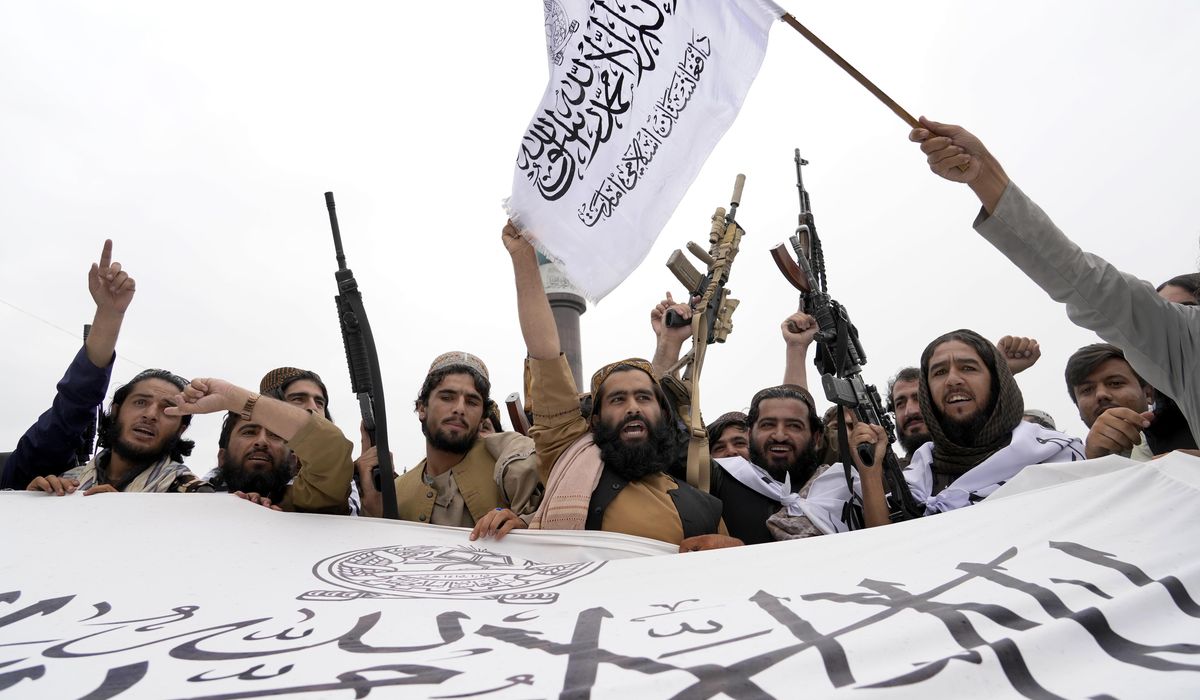

Former President Donald Trump and the Biden administration traded shots Monday over who bore the most blame for last year’s Afghanistan collapse, the deaths of 13 American troops and the abandonment of tens of thousands of Afghans who had been promised a safe place but who were abandoned by the U.S. withdrawal.
Mr. Trump defended the withdrawal, which he set in motion with a 2020 agreement with the Taliban.
But he said on Truth Social, his web platform, that the pullout didn’t have to result in the chaos that splashed across television screens a year ago, with Kabul’s fall to the Taliban, U.S. troops chased back to the confines of the airport, and people falling to their deaths from the wheels of evacuation planes.
“The Afghanistan disaster of exactly one year ago was the most embarrassing, incompetent and humiliating event in the history of the United States,” Mr. Trump said.
He said he deserved credit for cutting the number of troops to about 2,000 by the end of his administration “in preparation for leaving,” but said “the way we left” led to the suicide bombing that killed 13 American troops and left behind hundreds of U.S. citizens.
The Biden White House said it was Mr. Trump who set Afghanistan on the path to chaos.
SEE ALSO: Biden ‘marks’ anniversary of Taliban takeover with silence, vacation
In a memo over the weekend, National Security Council spokesperson Adrienne Watson said they were dealt a losing hand by Mr. Trump thanks to a 2020 deal with the Taliban that undercut the U.S. position.
“Former President Trump’s 2020 agreement with the Taliban empowered the Taliban, weakened our partners in the Afghan government, and committed to withdrawing our troops a few months after President Biden’s inauguration – with no clear plan for what should come next,” she said.
She pointed to the testimony of Gen. Kenneth F. McKenzie Jr., who as head of U.S. Central Command oversaw Afghanistan operations, and who said the withdrawal deal kneecapped Afghanistan’s security forces by creating a date-certain when they would lose America’s assistance.
“When we took office, the Taliban was in its strongest military position since 2001, former President Trump had released thousands of Taliban fighters from prison, and we had the smallest number of U.S. troops on the ground,” Ms. Watson said.
Yet she, like Mr. Trump, defended the idea of withdrawal as the right call.
“Bringing our troops home strengthened our national security by better positioning us to confront the challenges of the future and put the United States in a stronger place to lead the world,” she said. “It freed up critical military, intelligence, and other resources to ensure we are better poised to respond to today’s threats to international peace and stability.”
James Jeffrey, chairman of the Wilson Center’s Middle East program, said on that count, both administrations are right.
“I strongly supported the bipartisan efforts of the Trump administration and the Biden Administration to pull out,” said Mr. Jeffrey, who served as deputy national security advisor in the George W. Bush administration, ambassador to Iraq under President Obama and special envoy to the Global Coalition to Defeat ISIS under President Trump. “We had failed to maintain anything like the goals we had set out for ourselves. That decision was correct. The withdrawal was not.”
Mr. Jeffrey, who was on the ground for the withdrawal of U.S. troops in Iraq in 2011, said Mr. Biden ignored ample warnings Afghanistan could crumble even as troops withdrew. He said there was also no indication that Mr. Biden attempted to push the withdrawal closer to the winter which may have yielded a more permissible environment.
“Any evacuation is chaotic,” he said. “Any evacuation has far more people seeking to leave than you are going to be able to handle. Nonetheless, it was not done well. He was right on the overall policy. He was wrong on not planning and ensuring that we did not have a chaotic evacuation.”
The Afghanistan withdrawal was the worst foreign bungle for the U.S. since Benghazi, with the western-backed government in Afghanistan collapsing a year ago, on Aug. 15, 2021. Politically, it also marked the end of a honeymoon period for the Biden administration.
Mr. Trump’s comments Monday echoed his complaints over the past year, saying the Biden administration showed weakness with its handling of Afghanistan.
Mr. Trump often combines his blame for the Biden administration with a defense of his own decisions, including the 2020 Doha Agreement that laid out a timeline for withdrawal.
It called for U.S. troops to be out by late spring 2021. Mr. Biden delayed that date to Sept. 11, 2021, before realizing that was symbolically bad timing, and moved it to the end of August.
Mr. Trump, in his campaign-style rallies, tells audiences that he was prepared to break his deal with the Taliban and delay the withdrawal until the country’s stability was assured.
Mr. Trump on Monday did make one false claim about the withdrawal, saying it gave “the enemy” more than $85 billion “of the best military equipment in the world. So Sad!”
In fact, the special inspector general for Afghanistan Reconstruction says that the Defense Department’s best estimate was that about $7 billion worth of U.S.-supplied equipment was still in-country, in various states of repair, at the time of the government’s collapse last year.
The inspector general said that while some of that has fallen into the hands of the Taliban, it’s not clear how much.
